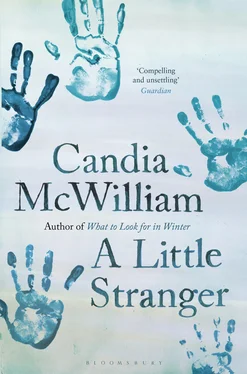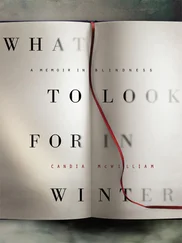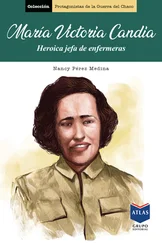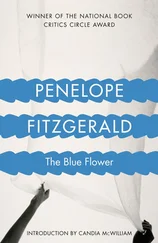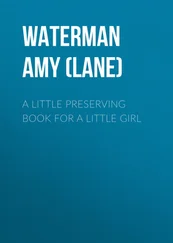Candia McWilliam - A Little Stranger
Здесь есть возможность читать онлайн «Candia McWilliam - A Little Stranger» весь текст электронной книги совершенно бесплатно (целиком полную версию без сокращений). В некоторых случаях можно слушать аудио, скачать через торрент в формате fb2 и присутствует краткое содержание. Год выпуска: 2011, Издательство: Bloomsbury UK, Жанр: Современная проза, на английском языке. Описание произведения, (предисловие) а так же отзывы посетителей доступны на портале библиотеки ЛибКат.
- Название:A Little Stranger
- Автор:
- Издательство:Bloomsbury UK
- Жанр:
- Год:2011
- ISBN:нет данных
- Рейтинг книги:3 / 5. Голосов: 1
-
Избранное:Добавить в избранное
- Отзывы:
-
Ваша оценка:
- 60
- 1
- 2
- 3
- 4
- 5
A Little Stranger: краткое содержание, описание и аннотация
Предлагаем к чтению аннотацию, описание, краткое содержание или предисловие (зависит от того, что написал сам автор книги «A Little Stranger»). Если вы не нашли необходимую информацию о книге — напишите в комментариях, мы постараемся отыскать её.
A Little Stranger — читать онлайн бесплатно полную книгу (весь текст) целиком
Ниже представлен текст книги, разбитый по страницам. Система сохранения места последней прочитанной страницы, позволяет с удобством читать онлайн бесплатно книгу «A Little Stranger», без необходимости каждый раз заново искать на чём Вы остановились. Поставьте закладку, и сможете в любой момент перейти на страницу, на которой закончили чтение.
Интервал:
Закладка:
Margaret purchased a new jumper. It celebrated the springtime. Although it was made of the wool of lambs, it showed the floral rather than the animal attractions of the season. About her grew tall woollen daffodils, their trumpets little yellow finger stalls, in bas-relief from her curving breast. John loved the jumper; he fingered the trumpets with relish.
‘There was a cardy with foxgloves, but it didn’t look very nice,’ said Margaret.
‘How so?’ asked John, an expression he had from me, so I liked him to use it.
‘Never you mind,’ said Margaret, rolling her eyes at me in alliance, adult female knowledge protecting the child from those flowering purple towers in our minds. I found it hard to imagine spending my professional life knitting priapic mauve cosies, but were my bits of work any more necessary than that? Nor could anyone be said to be kept warm by them.
Inside our house women worked; in the garden men were employed. There were two women who cleaned, and one who cooked; there was Margaret and there was me. No two of us were equal, though I felt that it was not I who established the hierarchy. There was me, useless but essential, with the others below, each at her allotted, or, it may have been, chosen, level. The woman who cooked rarely did so for Margaret, though sometimes there was a bartering of delicacies, if the adults were eating something to John or Margaret’s taste. He loved savouries and would beg for cheese. Margaret discouraged this, so he learnt to approach the big kitchen when she was busy. He liked the peelings of winter vegetables, and might sit beside Lizzie as she made stew; he did not eat them, but he dropped them from a height on to the chapped wooden table to see what letters they made when they landed; ‘J’ came often, and ‘S’, and ‘M’, for ‘Margaret’; and for ‘Mummy’. The clean smell of shucked roots and the sweetness of cooking parsnips clung to his hair, so Margaret would find him out.
‘Eating piggy food again, young sir?’ she would ask, and sweep him off for a hairwash. With the side of her knife, Lizzie would push the squared roots she had been saving for John into the deep pan she clipped to the table with one hip. She was sensible and knew children, having had several. She was not discontented with repetition, but comforted by it, so that her cooking and her conversation had a soothing constancy. She was free of any urban compulsion to entertain, so she was always interesting; her hair was long and rosy grey, and she read books in one hand as she stirred with the other. It used to be on her days off that I composed my tart feasts. Lizzie seemed to like Margaret. I had never heard her discuss people, unless through the foods they favoured. I hoped that she did not realise my tastes.
Her husband worked in the garden; they conspired to grow and to cook really enormous leeks, like organ pipes, from one trunk of which she could wring vichyssoise for ten. Sliced across, these monsters resembled white short-playing records. This seemed to be Lizzie and Basil’s only vagary.
Then there were Edie and Bet. Edie’s mother and father had worked in this kind of household, already fairly anachronistic, when, in their late middle age, Edie was born. She was an old-fashioned girl, a loved late child, quiet and sober. She was in her thirties, pretty, unpainted and stern; she had a straight back and wore straightforward clothes, like those of a middle-class child in the 1950s. Sometimes she laughed until she cried. If anyone exaggerated, including me, she said something to deprecate the needless inflation. She looked like someone who might have a singular, solitary talent, marquetry or the violin. Her husband was a research biologist. Her privacy was complete.
Bet in private was unimaginable; she was entirely public. Her hair was red, her mouth was red, and often her eyes were too. Occasionally one of them was black and yellow. She was a tub with tiny hands and feet; she always wore high heels. She crashed things about as though she were working in a hospital. She made rude jokes, and indented regularly for a pay rise, to keep up, as she explained, with her friend who worked at the meat-packing depot.
‘Hi,’ she would say, ‘it’s the shop steward.’ And she would come into my morning-room with a cup of coffee for me and a list of requests. Her sons were always in trouble, stealing or playing truant, and her husband lost work intermittently when he was ‘badly’. She loved pretty things and was violently maternal. ‘Oh, John,’ she shouted, ‘oh, look at you. I could eat you on toast.’ She kissed him wetly on his neck and played with his striped hair. From most people he flinched, but he loved Bet. She bought him presents she could not afford, and often asked to take him home with her. To John too this was an unspeakably glamorous prospect. She swore terribly but never acknowledged this with apology, so the bad words were not salient. Bet had done everything: she had wed a bigamist, she had been to Canvey Island every summer all her life. Both her natural parents were dead, but had left relicts — Bet’s step-parents — who lived with her and her husband and their boys. Bet had romantic plans for her stepmother and stepfather. Her husband bred fancy guinea-pigs with whorls in their fur; sometimes she brought one for John to look at, in a box, in the back of her car; the box had come as a rule from the supermarket, after dark, containing slightly sub-standard crisps, or imperfect pizzas. Bet knew where to get seconds of the already most inedible foods; her best connection in this way was the friend who got her unlabelled cans. ‘Could be giblets, could be niblets, they’re not fussy but I must say I would not eat those dirty pheasants if I was paid. I seen what they eat.’
Our own pheasants were hand-reared by Robert and his helper and ate pheasant food and then, in the brief glorious autumn of sex and showing off, the berries and worms growing and thriving upon our land. Their crops, when they were drawn, were often fat with soft good grain, grown to perfection under the best supervision, the grain which fed the people. What could she mean?
I was dead-heading the more undimmable camellias, quite pleased to be in at the extinction of their brightness, when Bet came out to me. Something must be worrying her for she did not like the out-of-doors; it spoiled her heels, she said, and gave her a wicked appetite. During the short season of soft fruit, she stopped wearing her tripping heels and wore white plimsolls which were pink by its end.
‘How d’you get them white for next year?’ Edie would ask.
‘Boil them for gym-shoe jam, Ede, what’d you do?’
‘Wear boots.’
Today Bet had come in her high red pumps, down the garden to the longest border. There had been no frost for days and the sun was encouraging the garden to rashness. Tiptoeing so as not to sink into the paths, she recalled someone afraid to wake a sleeper.
I called to her, ‘Go on the grass, in your bare feet,’ but she grimaced and continued her dainty progress. These scarlet roses were grotesque in age; they had bletted like fat tan onions. They plopped on to the canvas donkey I had put down at the border’s edge.
‘Damp grass on my bare feet drives me to feel I’ll vomit,’ said Bet. ‘The worst of all being seaside turf, making the reason why I will not stand picnics. But I’ll stand on this bit of cloth if I may, so’s I don’t end up in Australia, even if in my best shoes.’
‘Might be nice in Australia, at the moment. All that sun.’ I was rocking my clippers about a tough sucker. ‘Still,’ and I clipped through it, ‘I don’t much like the idea of turkey under the sun, do you? Or do you?’
‘You may and you may not like it, but I’m here to say it.’ Bet was a short woman and she was squinting up at my leafy head. I tried to coil up the long thorny sucker, could not, and chopped it in four. Its lowest thorns were hooks of grey, the fresh ones a translucent scarlet in the sun. I laid down these rosy scourges on the earth.
Читать дальшеИнтервал:
Закладка:
Похожие книги на «A Little Stranger»
Представляем Вашему вниманию похожие книги на «A Little Stranger» списком для выбора. Мы отобрали схожую по названию и смыслу литературу в надежде предоставить читателям больше вариантов отыскать новые, интересные, ещё непрочитанные произведения.
Обсуждение, отзывы о книге «A Little Stranger» и просто собственные мнения читателей. Оставьте ваши комментарии, напишите, что Вы думаете о произведении, его смысле или главных героях. Укажите что конкретно понравилось, а что нет, и почему Вы так считаете.
